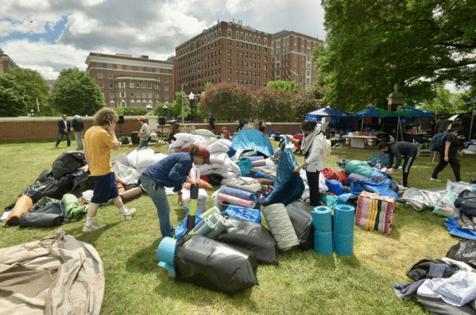Two Hopkins students for Palestine injured during police destruction of encampment, activists say
Published in News & Features
Two Johns Hopkins University student protesters for Palestine were injured during the university’s response to an encampment Thursday morning, a campus activist group said.
“Within the hour, demonstrators were met with indiscriminate aggression and physical harassment by armed Johns Hopkins Police and Baltimore Police officers, resulting in the injury of two students and destruction of personal belongings,” wrote Hopkins Justice Collective in a Friday news release. A university spokesperson said in a statement Thursday that school officials did not observe any injuries.
More than 30 officers from Johns Hopkins Police and the Baltimore Police Department were deployed to the encampment site on Hopkins’ Keyser Quad on its Homewood campus, the release says. Officers threatened arrests and engaged in “threats and verbal harassment well outside the scope of their putative role of enforcers of public safety,” it says.
The non-life-threatening injuries resulted from when “officers pulled canopies down onto students’ heads, significantly bruising protestors and causing wounds to the mouth,” according to the collective. Photos posted to the group’s Instagram show some of the injuries, including of bruises and a split lip.
Hopkins says the protest was against its policies, as encampments are not permitted. A university spokesperson said Thursday that only Johns Hopkins Public Safety and Johns Hopkins Police responded to the encampment and that the incident was handled in “an orderly and highly professional manner.”
The Baltimore Police Department did not immediately respond to The Baltimore Sun’s questions Sunday.
“Rather than engage with us in good faith, Hopkins called armed officers on the protest, not hesitating to use violence against any sign of dissent,” Hopkins Justice Collective said. The group is demanding the Baltimore university divest from Israel and Israeli companies, end the presence of Hopkins’ police force and U.S. Immigration and Customs Enforcement on campus, and “commit to science for humanity.”
The last demand entails a commitment to diversity, equity and inclusion in scientific research, and that the university convert its Applied Physics Laboratory “from a manufacturer of death to a laboratory dedicated to scientific research for humanity.” The Applied Physics Lab received a maximum contract of $3 billion from the Department of Defense’s Missile Defense Agency in December.
“The APL makes it clear that JHU is a military research institution first, and a university second,” Hopkins Justice Collective wrote in February in an op-ed in the school’s student newspaper. The organization did not immediately respond to a request for comment.
Hopkins Justice Collective also said the chief the university’s police force threatened protesters with arrest.
“At one point, Johns Hopkins Police Captain Branville Bard had to be restrained by another member of public safety personnel who had to remind him to stand down. At another point, he ‘singled out a protest[e]r: ‘If you keep this up, you’ll be the first one arrested,” the release says.
In a statement sent to the school community Friday, Bard and Vice Provost for Student Affairs Rachelle Hernandez wrote that the incident took less than an hour to resolve and involved fewer than 25 people.
Later, a smaller group of HJC members tried to reoccupy the quad that afternoon, but protesters departed after being asked to leave, the statement says. It added that the Hopkins Justice Collective “is not a recognized student organization, and their members have repeatedly violated university policies.”
“We are taking both of these incidents very seriously. Johns Hopkins supports free speech, including protest and demonstration,” Hernandez and Bard wrote. “But encampments are not how we engage with one another as a community – and Johns Hopkins does not tolerate antisemitism or other forms of group hatred and discrimination.”
Thursday’s protests are now being investigated by Hopkins’ Office of Student Conduct for violations of the school’s protest and demonstration policies, as well as the Office of Institutional Equity, which will investigate threats, harassment, intimidation or discrimination under Title VI, the statement says. Hopkins recently resolved a Title VI investigation with the U.S. Department of Education.
“We can and should take up hard issues and engage in serious dialogue with those with whom we disagree, but we must do it in a way that allows for genuine, open, and thoughtful debate and enables everyone to participate in those conversations without fear of intimidation,” Hernandez and Bard said in the statement.
Hopkins’ police force has long been controversial, inspiring protests since its inception. Most recently, a coalition of activists including Hopkins faculty protested City Hall demanding a public hearing on the force.
Student activity in support of Palestine exploded last year nationwide after Israel’s offensive in Gaza responding to Hamas’ Oct. 7, 2024, attack. At Hopkins, the student encampment lasted for 13 days after negotiations with school administration yielded a commitment that the school would review students’ demand of divestiture.
In January, the university’s Public Interest Investment Advisory Committee said it would not refer the divestment proposal to the school’s board of trustees, partly due to a lack of consensus among the school’s community.
________
©2025 The Baltimore Sun. Visit at baltimoresun.com. Distributed by Tribune Content Agency, LLC.







Comments